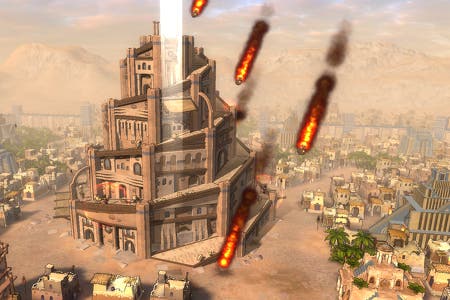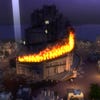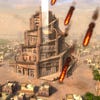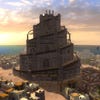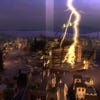Babel Rising Review
Smite and magic.
In the beginning, God created the heaven and the earth. And the earth was without form, and void; and darkness was upon the face of the deep. And the Spirit of God moved upon the face of the waters. And God said, Let there be light!
But there was no light, because Kinect hadn't heard Him, even when He spoke loudly and clearly. And God did try to smite those who defied him, but that didn't work either, for Kinect was having trouble reading the frantic flapping of God's left hand. And, ye, the camera did spin and slide despite the Lord's best efforts. And, lo, God was driven to fury by the heretic technology, for God had better things to do than stand in his living room, waving his arms like a demented penguin. And so it came to pass that God grabbed a joypad instead and did cast Kinect aside into the darkness of sulphur and fire.
The good news: Babel Rising is a Kinect game that doesn't insist you play with Kinect. The bad news: even with a joypad, it's a game that feels fiddly, frustrating and compromised. For a game in which you play as God, it seemingly goes out of its way to make you feel impotent and ineffectual.
So, yes, you play as the actual proper famous Old Testament God in Babel Rising, but it's not a god game. The mechanisms are closer to tower defence, as you fight off waves of attackers who follow set paths, but the twist is that you're actually trying to destroy the tower by smiting the heretics who are building it. You're doing this because if they build the tower it will touch Heaven and ensure that mankind is united by one language and one goal. Clearly, what with the Old Testament God being a bit of a jerk, that won't do. You must stop them, and doom our entire species to a future of pointless rivalry and nationalism. Yay!
Being God, you have command over the elements - Water, Earth, Wind, Fire - in order to achieve your bizarre and sadistic goal. Each element offers two basic attacks. One is a local attack for picking off small groups of workers as they trudge up the helical ramp, carrying stones that will raise the tower higher. Go on, lob a rock at that one. Fry those with lightning. Conjure up a storm cloud to slow everyone down.
For more widespread mayhem you can call on "trail" attacks, which are guided around the screen. A wall of flame, perhaps, to block and burn the infidels. Or maybe an earthquake. Attacks can be combined - in the sense that you can hit people with more than one power at once - but while there's a tantalising world of elemental carnage lurking inside Babel Rising's concept, the gameplay never really lets rip. You can only have two powers at a time, and those are static in terms of form and function. There's no system for upgrading or improving your abilities. What you see in the first few levels is what you get, a narrow approach that leaves you feeling constrained by your power options, rather than liberated.
What variation there is comes in the shape of Ultimate Power attacks, which are activated by building up a power gauge with the base abilities. These smart bomb equivalents are capable of wiping away scores of encroaching humans, either through a crushing tidal wave, a rain of meteors, a boulder that rumbles down the spiral pathway to the bottom or a ferocious sandstorm that blows everyone away.
Everything is there in concept, but in execution it falters. Control is awkward, regardless of whether you're throwing yourself at the mercy of motion control or clutching a joypad. In fact, a lot of the game's fussiness can probably be pinned on the decision to offer both. Accuracy, for example, is woolly with Kinect but twitchy with a controller. Since this is one those games that mistakes constant plate-spinning for a fun challenge, the inability to precisely target your divine retribution really counts against you as the campaign levels tick past. Once the workers start ascending the tower from multiple sides, all hope of nuance and tactics goes out of the window as you frantically spin the viewpoint, lurch up and down the tower and wait for powers to recharge.
There's just no balance or shape to the single-player campaign, with obstacles such as element-resistant priests and workers carrying cursed jars added to the mix. They make your job harder, but they don't make it more interesting. The game reveals too much of itself in the early going, leaving the rest as much of an uphill struggle as the one faced by your tiny stick men foes.
And they really are stick men, or near enough to make no difference. The game is graphically drab, with boxy buildings, crude figurines and attacks that lose their lustre all too quickly. The tower itself doesn't even take shape - chunks of it just appear as workers reach the ill-defined "top" and vanish in a puff of smoke. While the idea of lobbing thunderbolts as a slighted deity is strong, the game world fudges it badly. Some real destructible scenery, populated by ragdoll characters on which to unleash your wrath, would go a long way to compensate for the game's flatline structure.
For your ongoing pleasure, there's a survival mode which is more or less the same as many of the single-player levels except for the absence of a time limit, and also local multiplayer in which you can compete or co-operate in variations on the same limited gameplay ideas.
Babel Rising has a killer hook, but ultimately fails to use it for much more than the basics. Its entertainment value is simple and occasionally cathartic, but is exhausted far too early. Levels drag on, objectives become a grind and unleashing fiddly disasters on stick figures isn't enough to sink the hook deeper. Splitting the design to cater for both motion control and joypads certainly doesn't help, but even if it had been developed exclusively for traditional controllers it's hard to see how this thin template would be enough to sell the epic godly action players will expect.
